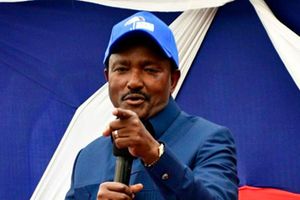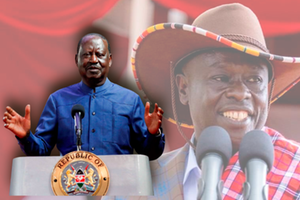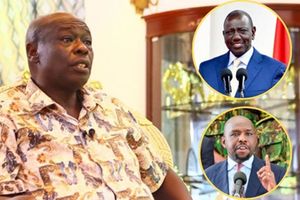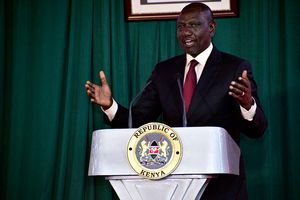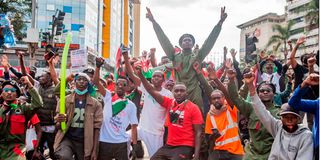
Protesters picket along Kenyatta Avenue in Nairobi on June 25, 2025 during the commemoration of the 2024 Gen-Z protests.
As Kenya marches towards the 2027 General Election amid uncertainty fuelled by youth-led protests, a silent storm is brewing – one that could upend political calculations and redraw the national map of power.
At the heart of this shift is Generation Z: the young, digitally savvy, politically conscious and increasingly restless demographic that has already demonstrated its strength through nationwide protests, most recently on June 25. The question now preoccupying political analysts and presidential hopefuls alike is simple but seismic: what does it take to win the Gen Z vote?
This is arguably no easy feat for a hard-to-impress group that has styled itself as leaderless, tribeless and partyless.

Protesters picket along Kimathi Street in Nairobi on June 25th 2025 during the commemoration of the 2024 Gen-Z protests.
According to the 2019 Kenya National Bureau of Statistics (KNBS) census, Kenya is a youthful nation, with over 75 per cent of its then 47.6 million people under the age of 35. The youth population aged between 18 and 34 stood at 13.7 million, translating to an estimated 29 per cent of the national population.
If mobilised to register and persuaded to vote in unison, this group could prove decisive in the election outcome.
Yet politicians are also counting on familiar dynamics, hoping that tribal and regional bloc voting –long the bedrock of Kenyan electoral arithmetic – will continue to hold sway.
Currently, the political landscape is awash with intense competition among key players, all jostling to secure the support of young voters.
President William Ruto, accused of responding to youth unrest with brute force, including abductions and enforced disappearances, has simultaneously tried to win over the demographic with jobs, funding initiatives and digital engagement. Despite these overtures, protests persist – underscoring the trust deficit.

President William Ruto.
Still, the President often highlights youthful allies in a bid to counter the perception that he has lost the support of Kenya’s young.
Former President Uhuru Kenyatta has positioned himself as an elder statesman defending Gen Z. His messages urging youth to claim their rights have drawn sharp criticism from the Ruto administration.
An emerging anti-Ruto alliance – featuring DCP leader Rigathi Gachagua, Wiper boss Kalonzo Musyoka, former Interior CS Fred Matiang’i, DAP-K leader Eugene Wamalwa and Trans Nzoia Governor George Natembeya – is also in pursuit of Gen Z support. Former Chief Justice David Maraga and Busia Senator Okiya Omtatah are aligning themselves with the same demographic.
Former Prime Minister Raila Odinga, despite criticism over his cooperation with the Ruto government, is also seen courting the youth. Safina Party leader Jimi Wanjigi has declared himself a Gen Z ally, further intensifying the battle.
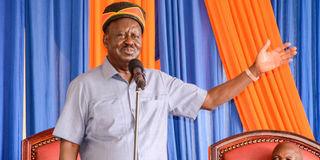
ODM leader Raila Odinga in Kisumu County on June 26, 2025.
In an August 8, 2024 TV interview, Mr Wanjigi revealed he helped finance the month-long Gen Z protests that began on June 25, 2024. “The protests are part of my route towards forcing President Ruto out of State House,” he said.
Mr Maraga, who has declared his 2027 presidential bid, told the Daily Nation on June 28, 2025: “If these youths’ chief agenda is good governance, a just society and equal opportunity, then I am their candidate. I won’t shy away from that.”
“The government should stop murdering the future and persecuting those who defend the abducted, murdered and hopeless,” he added.
Mr Maraga claimed to be a marked man: “They insult me in Parliament where I cannot defend myself, withdraw my security, teargas me and make all manner of threats. That’s not how a government gains local and international acceptance as a hub of rule of law, democracy and civility.”
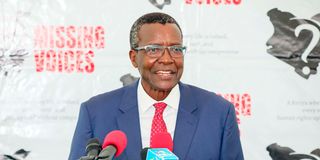
Former Chief Justice David Maraga.
Mr Kenyatta has also doubled down on youth advocacy. He defended the June 25, 2024 protests –sparked by the Finance Bill, poor governance and elite opulence – and has consistently urged youth to press for reforms.
Even after hosting President Ruto at his Ichaweri home in December 2024, in what some saw as a reconciliatory move, Mr Kenyatta has continued to champion youth-led constitutional activism.
On January 17, 2025, he said: “Some people are peddling fear – don’t buy it. Nothing lasts forever. Gen Z is the story of the future. Everything is worth fighting for. Don’t sit back and complain after achieving nothing.”
Mr Gachagua, in an NTV interview on June 27,2025, declared himself Gen Z’s “Uncle.”
“My relationship with Gen Z didn’t begin when I was forced out of office. I’ve been with them since my days as Deputy President,” he said.
He recalled opposing President Ruto’s national address on June 25, 2024: “While Ruto called the protesting youth treasonous anarchists deserving a crackdown, I held a parallel address calling them my innocent children merely expressing dissatisfaction.”
“For that act of defiance, I was impeached three months later. I sacrificed my job – the perks, the power and the comfort that comes with the position – because of them. But that’s nothing. I still support them – and they see in me a father figure willing to bite the bullet for their dream.”

DCP Party leader Rigathi Gachagua during an exclusive interview with NTV at his Karen home on June 27, 2025.
Even so, some Gen Z figures have begun aligning with ethnic kingpins. Kasmuel McOure, for example, has shifted allegiance back to government despite earlier opposition. Billy Mwangi, a government abduction victim, has joined Mr Gachagua’s camp and is eyeing the Embu Senate seat.
Gen Z is now split between the pro-government bloc and the anti-Ruto alliance. Others, like Mr Morara Kebaso, have stepped back from activism to focus on personal development.
Another youth faction is urging former Interior CS Fred Matiang’i to run for president in 2027. While he has yet to declare his intentions, support for him is growing.
Meanwhile, Mr Odinga continues to walk a tightrope – publicly supporting government initiatives while maintaining a strong grassroots network of young influencers to preserve his political capital.
Mr Natembeya, with backing from Mr Wamalwa, is building momentum in Western Kenya through his Tawe movement, which aims to harness youth energy for electoral gain.
Despite their rising influence, youth voter registration remains alarmingly low.

